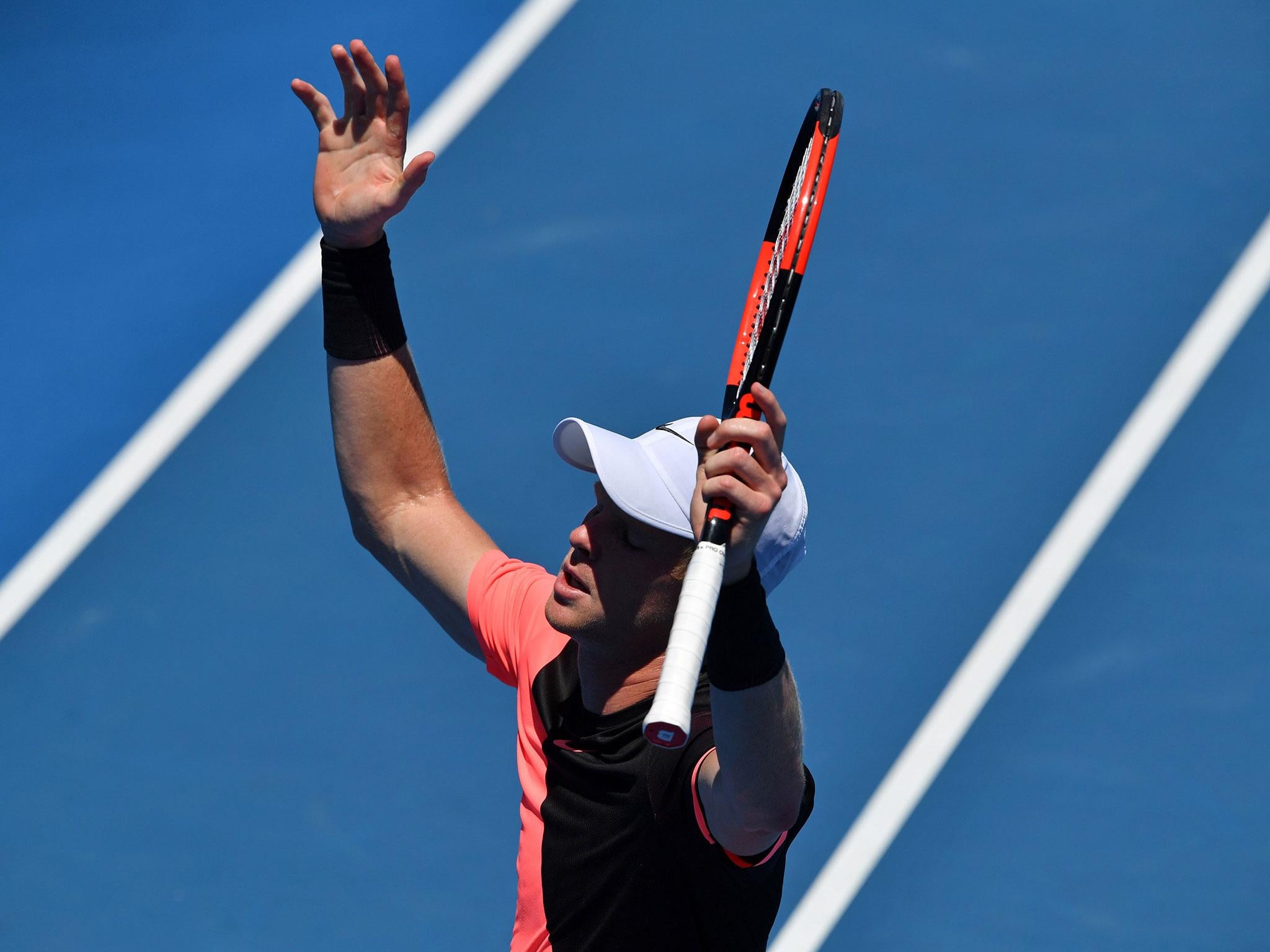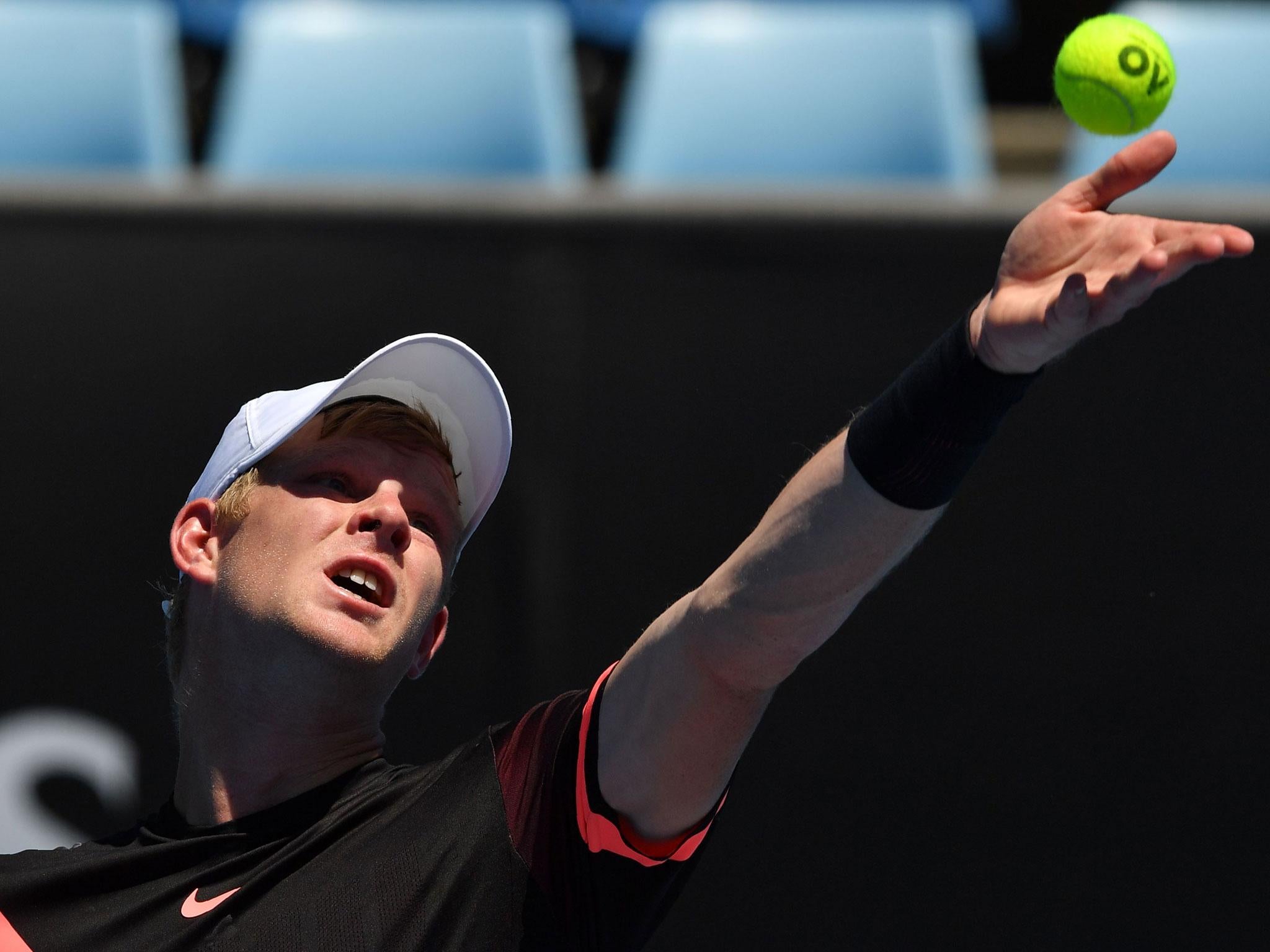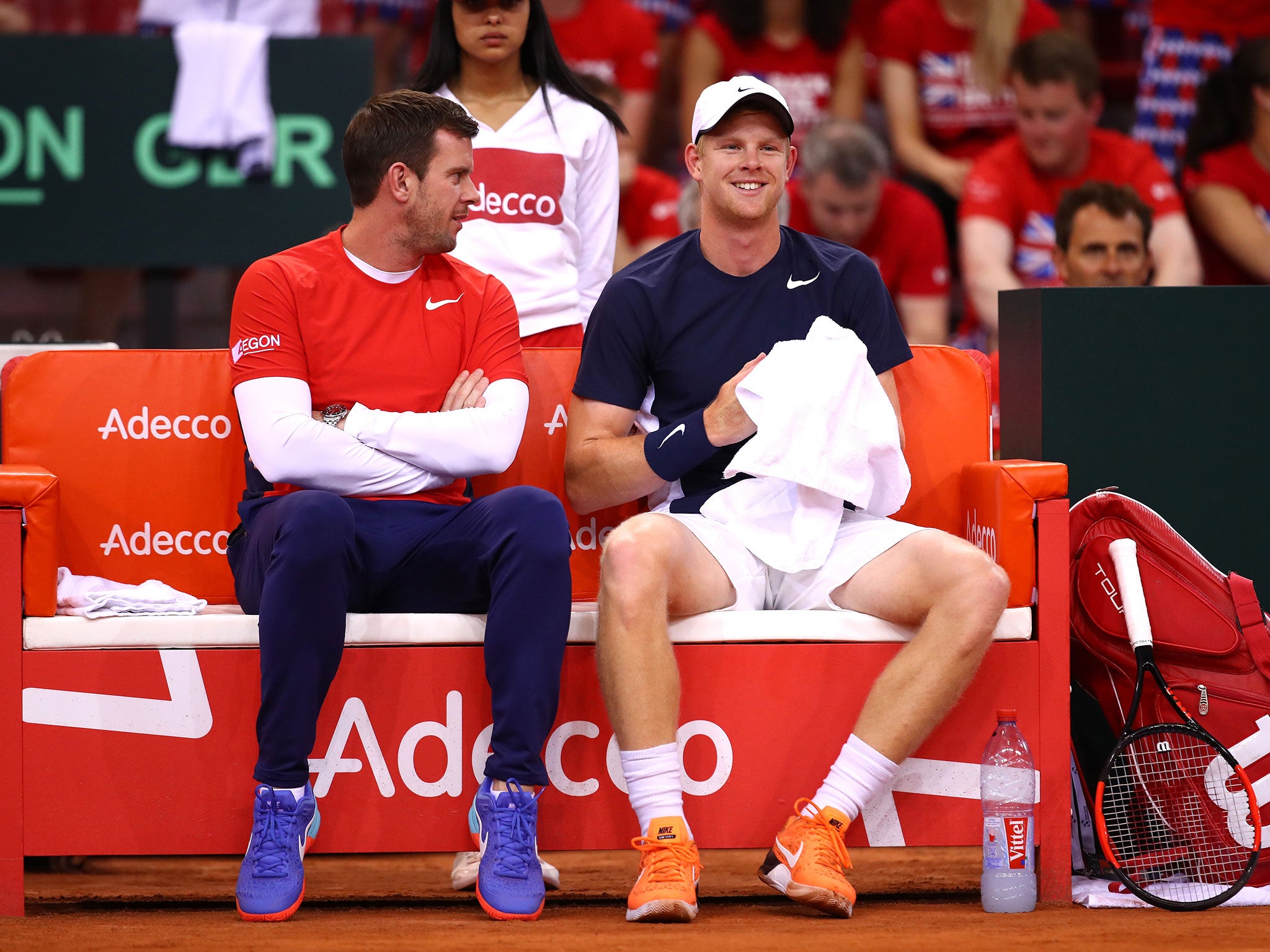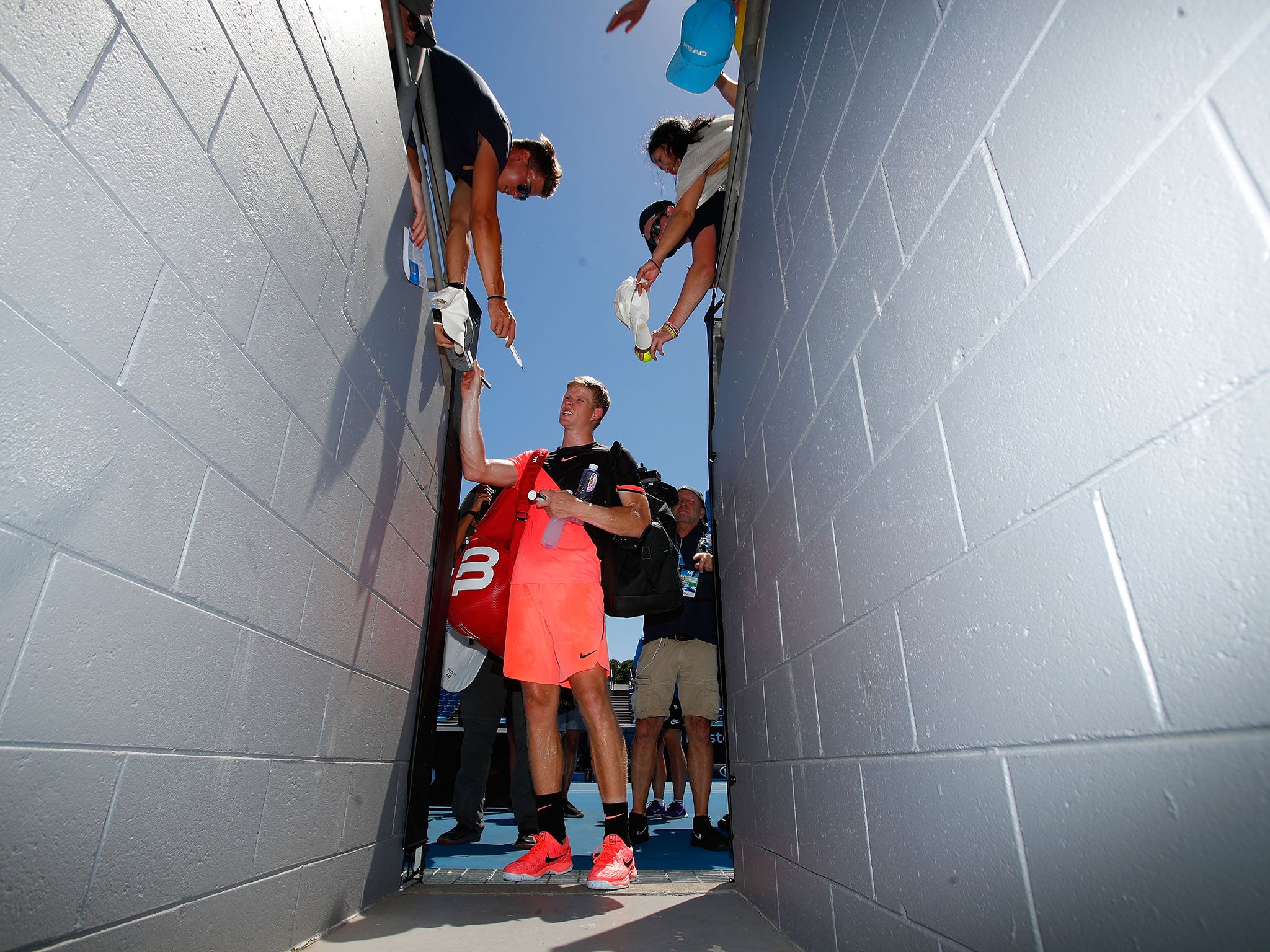Leon Smith on Kyle Edmund's Australian Open form and his evolution as a player
Smith has described Edmund’s progress as an evolution: 'He’s a year older and I think he’s got really good momentum with his new coaching set-up'

Leon Smith, Britain’s Davis Cup captain, thinks one of the keys to Kyle Edmund’s progress has been the work he has done on his serve and his returns.
Edmund, who beat Nikoloz Basilashvili in five sets in brutal heat on Friday, is through to the fourth round of the Australian Open. He next faces Italy’s Andreas Seppi on Sunday.
Smith, who was in the crowd on Court 2 to see Edmund reach the last 16 here for the first time, has noticed a small adjustment in the world No 49’s service action.
“A slight technical adjustment on the serve is paying dividends,” Smith said. “I think it’s looking a lot more secure. Serve speeds in the fifth set reflect that. He is also getting more balls back in play on the return of serve.”
Smith was particularly impressed with the way Edmund broke Kevin Anderson’s serve twice in the fifth set of their first-round encounter here.
“He is getting more balls back in play, sometimes chipping or blocking, not always going for the full swing, so I think he’s adding improved returns to his game,” Smith said. “What are the most important, most frequent things to get better? Serve and return. And I think those two things are what he has improved.”
Smith described Edmund’s progress as an evolution. “He’s a year older and I think he’s got really good momentum with his new coaching set-up,” Smith said.
At the end of last year Edmund parted company with his coach, Ryan Jones, and is now working with the experienced Fredrik Rosengren, assisted by Mark Hilton, who played a big part in Dan Evans’ rise up the world rankings.
Smith said: “There are quite a few people that start saying: ‘How is it going to work when you split with the coach?’ But there is no right formula or wrong formula for making it work.”
He said that Rosengren “has a real high intensity and has a wealth of experience working with a lot of top-10s on his CV, so that’s a big plus. And then he’s got Hilts, who did a terrific job with Evo, getting him to the ranking he was, and is a very well organised, very experienced now in his own right as a coach. I think it’s a really good balance.
“Ian Prangley, the trainer, has been with Kyle for a number of years now. He’s got a great set-up.”
Edmund himself paid tribute to the passion that Rosengren has brought. “He puts a lot into it,” Edmund said. “I wouldn’t say he is any more intense. I had Ryan Jones before and he’s a very intense coach, so it’s not like I see a massive difference.”

Smith has been impressed with the way Edmund has come from behind to win five-set matches this week against Anderson, the US Open runner-up, and Basilashvili.
“We’ve seen a couple of times in the past where Kyle’s struggled in these sort of positions,” Smith said. “He’s matured a lot. He’s worked hard, but you’ve got to go through it, put your body through it – and he did that today.
“You could see he was managing himself with the way he was breathing between points. He was calm, composed – and you’re not going to play that many matches in those conditions. He’s come through it.
“I thought the first match against Anderson was a massive step, because he’d lost quite a few matches, close matches against top 10, top 15 players. He’s lost five-setters and three setters – to Dimitrov the other week, to Rafa [Nadal] last year. He’s lost a lot of them, but had played really well.
“So the Anderson win was a big step forward, because I think he is getting a belief where he belongs. His level is there. Today was about what you’re doing, and your process, and showing a good amount of heart, guts and courage. I think it was a really important win.”

Smith has noticed a change in Edmund’s body language, too. The world No 49 has always been a low-key personality but he is now more demonstrative on court.
“If you look at even the start of his matches last year and you look at his body language now compared to six to 12 months ago, it’s different,” Smith said. “I have definitely noticed it. He is fist-pumping. I think because of his personality, he’s probably had to go through a bit of a stage where it doesn’t feel natural and it’s a bit forced to do it.
“It doesn’t have to be ‘Vamos!’ after every single point. That’s not necessary. But I think at the right times when he’s realising it’s a big moment in the match, he is turning to his coaching team and doing that. Even when I see him sometimes jogging after the change of ends, it’s just little things like that are a bit different. I think he has evolved that. I think it’s better.”
However, Smith was reluctant to comment on how far Edmund might go in his career. “I think it’s difficult to put targets and numbers on it,” he said. “His mind has got to stay right here. He knows himself that because of the way the draw has worked out, with the seeds going out, it’s a good opportunity here.”
Smith is confident that Edmund can cope with the pressure in the latter stages of a Grand Slam tournament, having seen him perform so well in the Davis Cup.

“He’s played a lot of big matches, he has been on the tour for a while, he has had those Davis Cup moments that are not necessarily bigger crowds, though the final was. He played Serbia, which was a big match, he’s played Canada, he’s played France, he’s played a ton of big matches now. He’s played [Novak] Djokovic on Arthur Ashe stadium.
“I think he’s well prepared. He’s a good lad in a really good headspace and he’s got the game. If he can match what we saw today, and against Anderson, the guts, fight, composure with his weapons, it’s a good formula. He’s doing really well.”
Smith was asked for his views on players having to play in such difficult conditions, with the temperature having reached 40C during Edmund’s match. “I think you have to look after the players,” he said. “I think there needs to be something that protects them, because it’s not coincidental to see someone doubled over.
“And it’s not necessarily the battle of the fittest, or who’s done the most amount of work. There’s the physiological element as well. Everyone has a different composition on their sweat, for example. You can train as much as you want but you can’t change the composition of your sweat.
“So, I think at some point there needs to be a commonsense approach. Maybe breaks after the set, so we’re not rushing them back, so the body temperature can cool a little bit and go again. I think some simple measures like that would be good. Maybe five minutes at the end of the set and then they can go again.”
Join our commenting forum
Join thought-provoking conversations, follow other Independent readers and see their replies
Comments
Bookmark popover
Removed from bookmarks